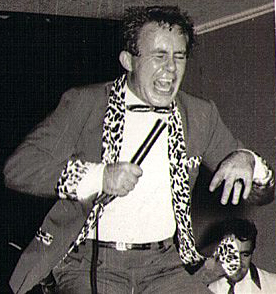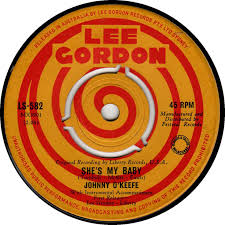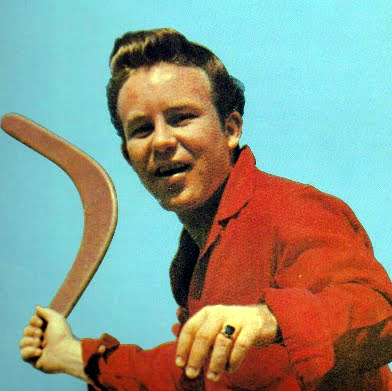Johnny O’Keefe

Do a search on the internet for Johnny O’Keefe (aka J.O.K. or The Wild One) and you will find plenty to keep you busy reading. But for the uninitiated here is a rundown on a man who released over 50 singles, over 40 EP’s and over 30 albums. He is also credited as being an inspiration to many Australian singers including the likes of a young Billy Thorpe.
Born John Michael O’Keefe 19th January 1935 in Bondi Junction, Johnny began his education at a local Catholic school in 1939 aged 4 ½. He then attended high school at Christian Brothers College – Waverly, leaving in 1951 at the ripe old age of 16. During his high school days he would sing at the odd school dance and socials. In 1952 he was called up for national service and was stationed at the Richmond RAAF Base and during this time he was known to do impromptu performances impersonating his idol at the time, Johnnie Ray.
The Fifties
The turning point for Johnny came in 1955, which is sited by many young singers of the time, when he saw the movie Blackboard Jungle which featured the song Rock Around The Clock by Bill Haley & His Comets. He now knew what style of music he wanted to pursue, something new called Rock ‘N’ Roll.
1956 he formed his first band the Dee Jays with his friend Dave Owens (father of Dave Owens Jnr) an American born Tenor Sax player. Their first performance was at Stones Cabaret – Coogee and by 1957 they were playing four gigs a week. Due to Johnny’s powerhouse performances and magnetic personality they soon attracted a strong local following. He would also wear some pretty outrageous (for the time) outfits too, including gold lame jackets and brightly coloured suits trimmed with fake fur or trimmed with leopard print velvet cuffs and lapels. The Wild One, as he would go on to be known, had arrived.
By now Johnny was good friends with promoter Lee Gordon, who was famous for his ‘Big Show’ concerts at the Sydney Stadium which would feature many overseas acts including Little Richard, Bo Diddley and Jerry Lee Lewis. Gordon offered the band the job of support to these overseas acts and Johnny jumped at the chance. With his popularity going from strength to strength he was now a full time entertainer.
One of these overseas acts was Bill Haley & His Comets, Johnny’s new hero. In 1957 Lee Gordon had brought them out to tour and Bill Haley was so impressed with Johnny and his band he recommended them to Ken Taylor the A&R manager for Festival Records. Soon after they were signed and their first record was You Hit The Wrong Note, Billy Goat on 78rpm!!

Early 1959 saw the Dee Jays hired as the resident band for a new TV show, Six O’Clock Rock on the ABC network. After only 6 episodes J.O.K. took over as host and also quickly took over the running of almost every aspect of the show. This TV exposure skyrocketed him to stardom and he became a household name. More records were to follow including, What Do Ya Know and Why Do They Doubt Our Love?, She’s My Baby, his first number 1 hit, Shout (Parts 1 & 2) and his signature tune Wild One which he co-wrote.
The U.S. push
She’s My Baby, had been recorded during a visit to Los Angeles with producer Snuff Garrett at the Goldstar Recording Studio in Hollywood. J.O.K. decided he wanted to take on the US. Lee Gordon had his doubts it would work but the ever ambitious O’Keefe had already set his sights on breaking into the American market. He met with Mickey Shaw who introduced him to the executives of Liberty Records and he was offered a contract.

He returned for a promotional tour in February 1960 billed as “The Boomerang Boy” the grueling tour took on 35 states but unfortunately Lee Gordon was right and he made little impact, although one record, It’s Too Late reached number 1 in New Orleans. The tour fizzled out and by November he was back home. He returned again in March 1960 to complete his contract with Liberty Records to record the songs Don’t You Know and Take My Hand but after the session Liberty did not renew his contract.
It’s Too Late became his 11th Australian hit but O’Keefe was totally broke and deeply depressed after the US failure. To try and help lift his spirits he bought a bright red 1959 Plymouth Belvedere on hire purchase. He began touring relentlessly driving up and down the east coast of Australia in his new car. He not only needed the money to pay off the car he needed to replenish his finances. He would return every Saturday for his commitments on Six O’Clock Rock.
During one of these trips in June 1960 he fell asleep at the wheel and ran into a Gravel Truck. With him in the car were his friend and writing partner Johnny Greenan and his pregnant wife, who unfortunately suffered a miscarriage due to the accident. J.O.K. was critically injured suffering multiple lacerations, concussion and fractures to his head and face. He lost four teeth, and his hands were also badly lacerated. He was air lifted back to Sydney for treatment but about six weeks later and against doctors’ orders, he returned to work on Six O’Clock Rock. He also had to undergo many operations to reconstruct his face, which left his appearance permanently changed, something he could never come to terms with. Despite this ordeal, he continued recording and scored a minor hit in August 1960 with Don’t You Know (Pretty Baby) and his next record, Ready For You reached number 14 in November.
In January 1961 he again took on the US market but this failed too and with all that had happened to him, the accident, his face needing surgery and the failure to conquer the US it started to take its toll. On a whim he flew to London, when he arrived he blacked out and was taken to hospital and woke up 3 days later suffering from nervous collapse. Fortunately Lee Gordon was also in London at the time and with his help J.O.K. was able to return to Australia.
The Sixties, back in Australia
O’Keefe’s run of Australian hits continued, I’m Counting On You became his second number 1 hit in August 1961, followed by Sing (And Tell The Blues So Long) reaching Number 2 in March 1962, and I Thank You which reached number 24 in December.
His tenure with Six O’Clock Rock had ended by mid 1961 but by October he was compering a new show on Channel 7. The Johnny O’Keefe Show was a major success but only added more stress to his life with an ever increasing work schedule and he suffered another breakdown in August 1962. He spent 2 months recovering in the Royal Prince Alfred Hospital. This started a cycle of breakdowns, hospitalisation, and recovery. At times he was replaced as host on his show, which had now become known as Sing, Sing, Sing, increasing his anxiety.
Fortunately he was still popular with the public and he had his 3rd Australian number 1 hit with Move Baby Move in July 1963. And later the same year his 4th number 1 hit You’ll Never Cherish A Love So True (Until You Lose It). It was around this time that O’Keefe finally parted ways with his faithful backing band the Dee Jays and he devoted more and more time to TV.
By late 1963 the music trends were changing and bands like The Beatles and The Rolling Stones were soon to take over the airways. This new style of music influenced many Australian artists and the local music scene was also changing. Bands like Ray Brown & The Whispers and Billy Thorpe & The Aztecs were becoming the new success stories. J.O.K. didn’t like this new style of “long-haired” bands and he refused to have many of them on his show.
His own popularity was starting to decline too; his last major hit was She Wears My Ring, April 1964 reaching number 2. The follow up single charted much lower only peaking at number 30. November 1964 saw O’Keefe have another spell in hospital. His popularity continued to decline and sales of his records fell. Sing, Sing, Sing was eventually cancelled in October 1965.
1966 was quiet with respect to records with only two songs making the charts. Be Careful Of Stones That You Throw, number 30 and The Sun’s Gonna Shine Tomorrow reaching 35. To add to his continuing stress he divorced his first wife Marianne after only 6 years of marriage.
In January 1967, he compered a new TV show called Where The Action Is on the new Channel 10 Network. But the series was not successful and with budget problems and low ratings this led to its cancellation in November 1967.
1968 onwards O’Keefe spent most of his time performing on the Australian club and cabaret circuit, any album releases were now compilations of hits. O’Keefe continued recording new singles during the late 1960s, with only three making it into the Top 40, Sun’s Gonna Shine Tomorrow only reaching number 38 in May 1966. Be Careful Of Stones That You Throw number 28 in August 1966 and a re-release of She’s May Baby reaching number 22 in August 1969.
He toured Vietnam during 1969 to entertain the Australian troops, signed a new recording deal with Festival Records and continued to release records but didn’t have another hit till a re-recording of his 1958 song So Tough which made it to number 7 in September of 1972.
The Seventies
January 1973 he played the Sunbury Pop Festival, initially being booed he eventually won the audience over.
1974 saw his last big hit with Mockingbird, a duet with singer Margaret McLaren. It became his 29th Australian hit, reaching number 8 nationally in April. August 1974 saw O’Keefe put together a package tour called The Good Old Days Of Rock ‘N’ Roll which featured many of his old friends including Johnny Devlin, Lonnie Lee, Jade Hurley and Tony Brady. It premiered at the St George Leagues Club and continued successfully for the next four years. O’Keefe continued to release singles but never again had another hit record.
By the late 70’s he had become a heavy user of drugs for a diagnosed bipolar disorder, he was also very depressed over the death of his idol Elvis Presley in August 1977, saying to friends “I’ll be next”. His last performance was on the Channel 7 program Sounds which was taped on the 30th September 1978. Six days later, 6th October 1978 he died, suffering a heart attack induced by an accidental overdose of prescribed drugs.
Johnny O’Keefe is remembered as a leader, his unique style made him the star he was, and his recordings alone are testament to an outstanding career. He paved the way for many of Australian’s future stars, he was …. The Wild One.
This is an excellent historical account of one of our great music pioneers.
I’m turning 50 this year so I was unfortunately too young to see JOK in his prime but my parents have many fond memories of his shows.
They both saw him play a number of times at Festival Hall Melbourne supporting some of the overseas acts.
My parents also tell me that he was so good that sometimes some of the overseas acts were jealous of the reception he received from the crowds. Sometimes if the overseas acts didn’t measure up the audience would call for JOK to come back on stage.
WHAT AN ABSOLUTE LEGEND.
Thanks David.
My father worked for Astor Records in Sydney from about 1953 – 1963. He met and became friends with a lot of the early rockers including the great Johnny O’Keefe. Unfortunately Dad had left that scene by the time I got into music and I also was too young to see Johnny perform live but from all accounts he was pretty damn good!!
GREAT TO SEE A STORY ON AUSSIE’S MUSIC LEADER, CERTAINLY FOR THE ONES KNOWING LITTLE OR NOTHING ABOUT THE GREAT J.O.K.
KEEP UP YOUR INTEREST IN AUSTRALIAN MUSIC MARK……….WE WILL ALL LEARN SOMETHING OVER A PERIOD OF TIME
Congratulation on this accurate account of JOK, his rise to stardom, and eventual fall. I remember my mother (passed away in 2014 at age 84) would never miss any appearance of her idol on her television and the shows that Johnny compared. For myself now at age 60 I remember very well the power that JOK put into his live performances he was “wild” on stage and gave incredible stage shows. He really was an icon to the early development of the Australian rock music scene. Following his terrible car accident, Johnny never really fully recovered due to his disfigurement and other factors. This was terribly sad and his road became one of struggle. At his height he was a superstar, one that all Australians should be proud of. I consider myself quite lucky because I have a treasured JOK vinyl L.P. record that belonged to my mother which sits proudly within my collection.
JOK used to appear at the Adelaide Festival out door concert at the sound shell next to the River, But a few years later was to see his Magic . a concert at Centennial Hall at the show ground. The concert was featuring the top Adelaide Groups as well. when JOK appeared a section of the crowd booed , JOK done what he was famous for he worked the crowd like I had never seen before.
I am 65yo man ..I remember jok ..alot crammed into a short life he had ..but wat a impact he had …all I can say is rest in peace jok …..I thank you ..
I first heard the music of J,O’k back around mid 1986, the tv minisries ‘Shout’ the story of johnny, o’ keefe. I was only 9 at the time but his voice ,energy ,performance just blew me away. Now nearly 30 years later I still love his Rock’n’Roll. This is a very good account of his life, I wish I could have been around in the 1950s & 60s and seen the Wild One , Johnny, O’ Keefe!
I saw JO’k at Highpoint Shoping Centre(called Highpoint West back then) in Melbourne when working there as a teenager. I’m not sure when it was but may have been 1977. I remember him wearing his white suit and such a huge name to perform at a shopping centre. How lucky I was!
Back in the 50’s & 60’s we did not have the Freedom kids do today (except where parents wrap them in cotton balls to protect them from stranger danger) I was bought up in a strict Welsh Methodist family in a country town Broken Hill in NSW back then it was almost as rare as hens teeth to have Rock N Roll concerts come to your town especially with leading artist from abroad. In this country town on the local Radio Rock N Roll was only played in one hourly slot each week. And a Rock N Roll show was coming to town on a Sunday in Roctober 1957 but I was not allowed to go being 11 years old and parents no lovers of Rock N Roll on this show was JOHNNY O’KEEFE, LITTLE RICHARD & HIS BAND, GENE VINCENT & THE BLUE CAPS, EDDI E COCHRAN, ALIS LESLEY
A well-written story about Johhny O’Keefe who is a big part of our music history.
I’m 57 yo but remember JOK from childhood.
I had copies of Shout and I’m Counting On You that was given to me by an auntie when I was about 10 yo and remember them playing So Tough and Mockingbird heaps on the radio in the mid-70s.
I remember exactly where I was when his passing was announced.
A fan always.
Cheers,
Baz.